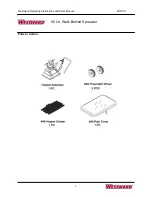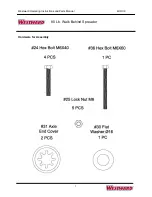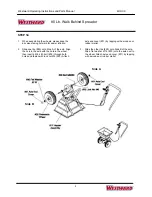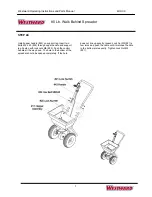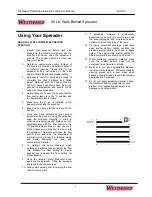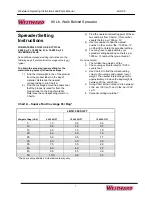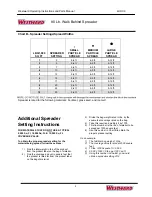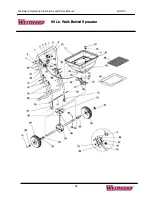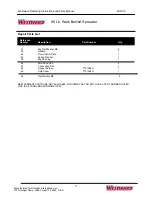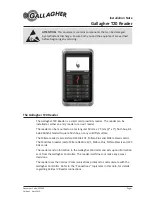
4UHC9
Westward Operating Instructions and Parts Manual
80 Lb. Walk Behind Spreader
Spreader Setting
Instructions
FOR MATERIALS THAT USE A TYPICAL
5,000 Sq. Ft, 10,000 Sq. Ft. & 15,000 Sq. Ft.
COVERAGE VALUE
See additional spreader setting instructions on the
following page if your material coverage value is not
typical.
To obtain the proper spreader setting for the
material being spread, follow these steps:
1) Find the total weight in lbs. of the product
from the product label on the bag of
material. Reference the nearest
corresponding row in Chart A.
2) Find the coverage amount in square feet
that the product is rated for from the
product label on the bag of material.
Reference the corresponding column in
Chart A.
3) Find the nearest intersecting point of these
two numbers from Chart A. (this number
equals the lbs. per 1000 sq. ft.)
4) Use this number to find the nearest
number in the column “lbs. / 1000 sq. ft.”
on Chart B to obtain the spreader setting.
5) You may have to approximate your
spreader setting based upon the lbs. per
1000 sq. ft. number that you arrived at.
As an example:
1. The fertilizer bag weighs 42 lbs.
2. The coverage value is rated at 15,000
square feet.
3. Use Chart A to find the corresponding
column of coverage and nearest row of
weight. The nearest intersecting point is
approximately 2.8 since the bag weight is
between 40 lbs. and 45 lbs.
4. Using Chart B, the number 2.8 is between
2 lbs. per 1000 sq. ft. and 3 lbs. per 1000
sq. ft.
5.
Spreader setting would be 7.
Chart A – Square Foot Coverage Per Bag*
LBS/1,000 SQ FT
Weight of Bag (LBS.)
5,000 SQ FT
10,000 SQ FT
15,000 SQ FT
5 1.0 0.5 0.3
10
2.0
1.0
0.7
15 3.0 1.5 1.0
20
4.0
2.0
1.3
25 5.0 2.5 1.7
30
6.0
3.0
2.0
35 7.0 3.5 2.3
40
8.0
4.0
2.7
45 9.0 4.5 3.0
50
10.0
5.0
3.3
*
These are only estimates. Actual amounts may vary.
7


